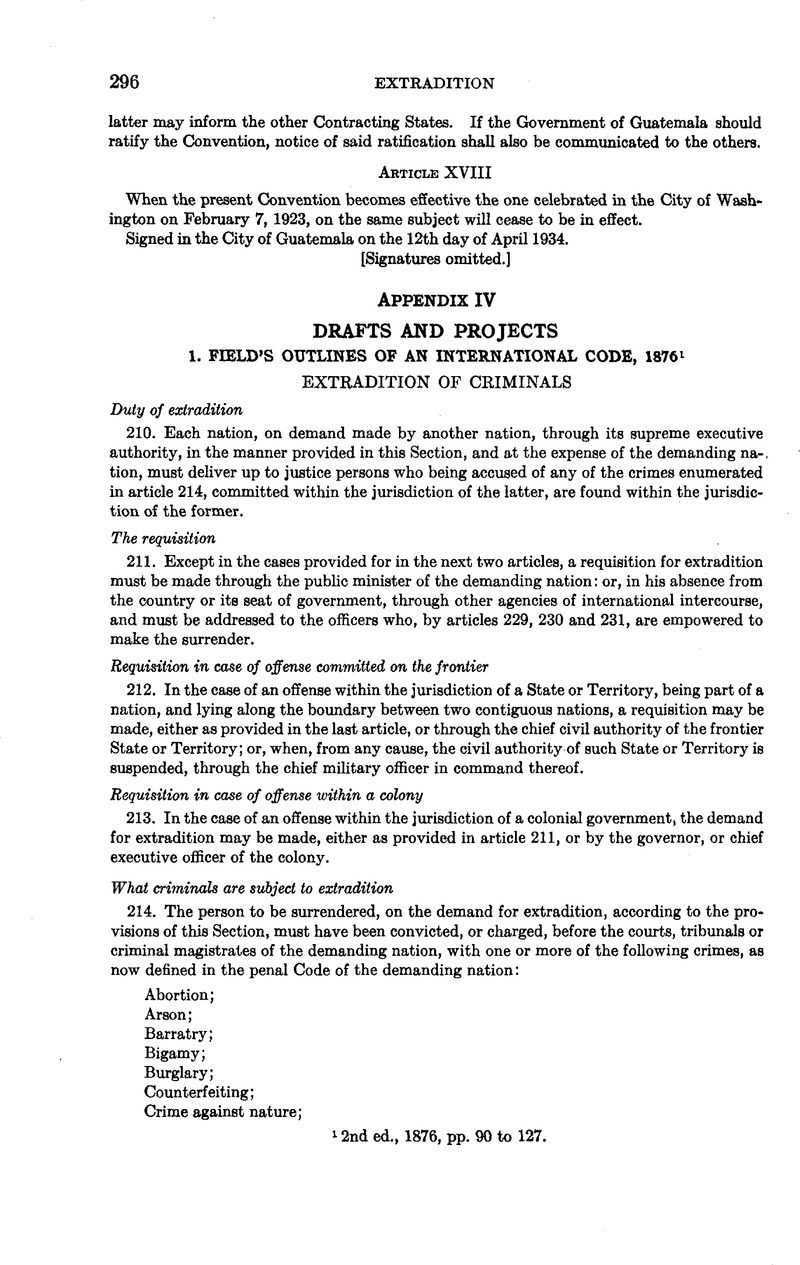No CrossRef data available.
Published online by Cambridge University Press: 12 April 2017

page 296 note 1 2nd ed., 1876, pp. 90 to 127.
page 300 note 1 Annuaire de I’Institut de Droit International (1880), V, p. 127. Translation from Scott’s Resolutions of the Institute of International Law (1916), pp. 42-45
page 301 note 1 American Journal of International Law, Special Supplement, Vol. 20 (1926), pp. 331-335.
page 305 note 1 Travers, Le Droit Pinal International (1922), Tome V, pp. 526-530. This draft does not seem intended primarily as the basis of multipartite action, but might be used for that purpose, and seems of sufficient interest to include here.
page 305 note 2 See Travers, op. cit, par. 2740, p. 519, Art. 8 [of a proposed Code of Criminal Procedure].
page 305 note 3 In a footnote to this article Travers suggests that fiscal, military, political and religious offences shall or shall not be mentioned in this clause according to identity or divergence of the conceptions of these offences in the legislation of the contracting States. The conditions of punishability of such crimes under the law of the requested State shall not appear in a treaty, as the legislation of the contracting States must be known to each other. Reference is made to Art. 8 of a proposed Code of Criminal Procedure, referred to in the next preceding note.
page 305 note 4 In a footnote to this article the author of the project refers to the principle of non bis in idem, and suggests that a requested State shall insist on withdrawal of prosecution of its nationals by the requesting State when it undertakes their prosecution itself. In connection with a case when a lighter penalty imposed for the same crime shall be deducted from a more severe one, he refers to paragraphs 28 and 1544 of his Droit Pénal International (op. cit., supra, I, p. 31 and III, p. 413)
page 305 note 5 “The requested State may, however, realize that it is not in a position to render a sound judgment, terminate the prosecution in progress and consent to the solicited extradition.” (Travers.)
page 305 note 6 In connection with the maxim non bis in idem, Travers refers to his (op. cit., supra), pars. 28, 1544, also to 2740, Art. 9 and footnotes
page 305 note 7 Cf. Travers (op. cit, supra), par. 2740, Art. 16, p. 523
page 305 note 8 Cf. Travers (op. cit., supra), par. 2740, Art. 15, p. 522. No more precise rule can be embodied in a treaty; otherwise the different agreements may come into conflict and the requested State will lose part of its freedom of action in dealing with the States not signatories to the convention
page 306 note 1 Travers (footnote to this article) denies the expedience of a direct communication of therequisition for extradition from the judicial officials of the requesting State to those of the requested State. On the other hand, he insists on the consul having the qualities of the consul de carriére as a guaranty of authority
page 306 note 2 “The person claimed shall be permitted to prove that the acts and circumstances are, according to Articles I, II, III of the treaty, of such nature as to preclude the extradition.” (Travers.)
page 306 note 3 “The requested government must have simple discretion on this point.” (Travers.)
page 306 note 4 See Travers, op. cit., supra, par. 2740, p. 523, Art. 17.
page 306 note 5 “Extradition is so broadly provided for in our conception that extradition in transit may be assimilated to it.” (Travers.)
page 307 note 1 See Travers, op. cit., supra, par. 2740, p. 524, Art. 21 and footnote.
page 307 note 2 Cf. Travers, op. cit, supra, par. 2740, p. 525, Art. 22.
page 307 note 3 International Law Association, Report of the Thirty-fifth Conference (1928), pp. 324-329; 4 Transactions of the Groiius Society (1929), pp. 108-112.
page 309 note 1 Recueil de Documents en Matiére Pénale el Penitentiaire, Vol. I., p. 478 (1931).
page 315 note 1 For States which have not concluded an arbitral agreement: “the arbitral settlement shall be regulated by a special agreement.”